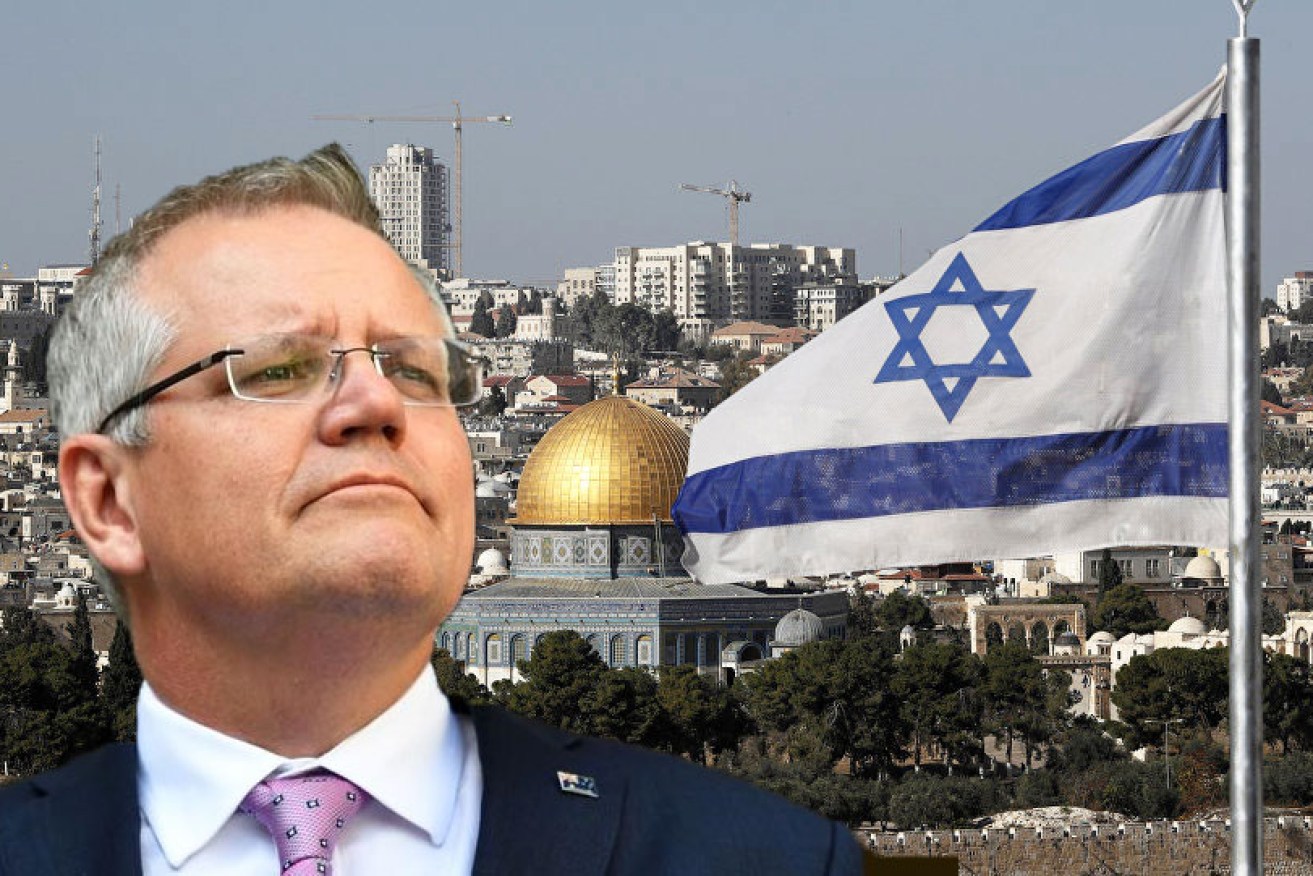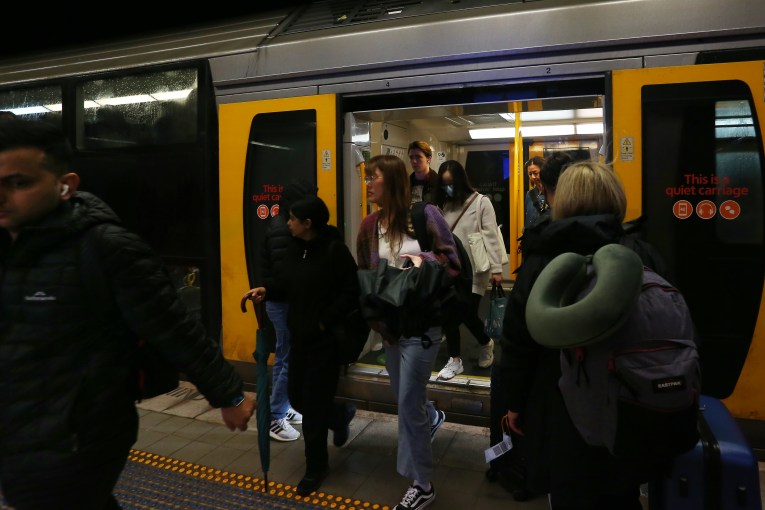Indonesia threatens trade deal over PM’s planned Jerusalem embassy


Mr Morrison's announcement follows talks with Wentworth candidate Dave Sharma.
Prime Minister Scott Morrison’s controversial decision to follow the US and move Australia’s Israeli embassy from Tel Aviv to Jerusalem has had immediate repercussions, with Indonesia threatening to put on hold a new trade deal.
Days before a crucial by-election in a Sydney electorate with a large Jewish population, Mr Morrison said on Tuesday his country was “open” to shifting recognition of Israel’s capital to Jerusalem while still being committed to a two-state solution.
But Indonesia, the world’s largest Muslim-majority country, has warned Australia that moving its embassy to Jerusalem could undermine a peace process between Israel and the Palestinians.
Indonesian Foreign Minister Retno Marsudi said she had conveyed her country’s opposition to such a move to Australia.
“Indonesia encourages Australia and other nations to continue to support the peace process and not conduct any action that could undermine the peace process and global security,” she said after talks with visiting Palestinian Foreign Minister Riyad al-Maliki.
Indonesian Foreign Minister: We have conveyed to Australia our opposition Re Embassy issue…. Indonesia encourages Aust and other nations to continue to support the peace process and not conduct any action that could undermine the peace process and global security pic.twitter.com/JpiOAYACLH
— David Lipson (@davidlipson) October 16, 2018
Indonesian Foreign Ministry spokesman Arrmanatha Nasir declined to comment on a report by ABC that Jakarta was considering putting a trade deal – due to be signed soon with Australia – on hold over Morrison’s comments.
The free trade agreement was cemented during Mr Morrison’s first international trip as prime minister – and was set to be signed before the end of the year.
It is set to unlock educational opportunities in the Asian country, which has a workforce of more than 130 million people but half of them only have a primary school education.
The ABC reported Australia’s ambassador in Jakarta has sought an urgent meeting with Indonesian foreign ministry officials to explain.
Indonesia’s support of a Palestinian state is one of its most important foreign priorities.
Australian exports to Indonesia grew 12% last year to be worth $8.6 billion. Australian exports to Israel fell 19% to $216 million. (Source: DFAT) https://t.co/n0AgAQ0oZg
— Mr Denmore (@MrDenmore) October 16, 2018
the worst consequence of this is not indonesia cashing out of a trade deal. its more palestinian people being beaten and murdered
— Scott Ludlam (@Scottludlam) October 16, 2018
Mr Morrison said no decision had been made to move Australia’s embassy, but he said arguments in favour of such a move were “persuasive”.
He played down the concerns.
“I have been in direct contact with President Joko Widodo over the course of last night and through this morning,” Mr Morrison told Parliament on Tuesday.
“I have been pleased to be able to explain very clearly the nature of the announcements that I have made today.
“And I have been very pleased with the response that I have received from President Joko Widodo.”
Mr Morrison said he looked forward to going to the ASEAN, APEC and G20 summits in coming months and talking about his ideas of doing things differently in the Middle East.
As well as the proposed embassy shift, Mr Morrison announced a review into support for the Iran nuclear deal and declared Australia will this week vote against the Palestinian Authority chairing a United Nations group.
The major shifts in Middle East foreign policy come five days out from the by-election in Wentworth, where 12.5 per cent of voters are Jewish.

Dave Sharma and Kerryn Phelps at a Wentworth forum on Monday. Photo: AAP
And while the Prime Minister dismissed questions about the timing of his announcement, he credited the Liberals’ Wentworth candidate Dave Sharma, a former Australian ambassador to Israel, with raising the embassy issue.
“Australia’s position on this issue has, to date, assumed that it is not possible to consider the question of the recognition of Israel’s capital in Jerusalem and that be consistent with pursuing a two-state solution,” he said.
“You can achieve both and indeed by pursuing both you are actually aiding the cause for a two-state solution.”
Mr Morrison insisted the coalition government remained committed to pursuing a two-state solution between Israel and Palestine.
“But frankly, it hasn’t been going that well. Not a lot of progress has been made, and you don’t keep doing the same thing and expect different results,” he told a media conference in Canberra.
Opposition foreign affairs spokeswoman Penny Wong said the prime minister was playing “dangerous and deceitful” word games before the Wentworth poll.
“This is a bloke who is prepared to do and say anything to hold on to his parliamentary majority,” Senator Wong said.
Mr Morrison’s public confirmation came shortly after Israeli Prime Minister Benjamin Netanyahu publicly praised his Australian counterpart on the Jerusalem issue.
In a Twitter post Tuesday morning, Mr Netanyahu confirmed media reports the Prime Minister was considering moving the embassy.
I spoke today with Australian PM @ScottMorrisonMP. He informed me that he is considering officially recognizing Jerusalem as the capital of Israel & moving the Australian embassy to Jerusalem. I’m very thankful to him for this. We will continue to strengthen ties between 🇮🇱 & 🇦🇺!
— Benjamin Netanyahu – בנימין נתניהו (@netanyahu) October 15, 2018
If Australia does proceed, it will following the decisive move by US move its embassy this year, effectively recognising the holy city of Jerusalem as the ‘true’ capital of Israel.
The opening of the US embassy prompted demonstrations and violent clashes between protesters and Israeli forces along the border between Israel and the Palestinian territories.
Australia abstained from a UN vote last year overwhelmingly condemning Washington’s decision to recognise Jerusalem, which is home to Muslim, Jewish and Christian holy sites, as the Israeli capital.
A total of 128 countries backed the December 22 UN resolution on rejecting Mr Trump’s decision to move the US embassy to Jerusalem.
Nine nations voted against the resolution, while 35 countries, including Australia, abstained.
New Zealand Prime Minister Jacinda Ardern on Tuesday said moving Australia’s embassy to Jerusalem would not help peace talks in the Middle East.
“We support a two-state solution and our view has been that any shift in representation, in the way we saw with the United States, does not move us closer to that peaceful resolution,” Ms Ardern said.
Formally recognising Jerusalem would also be a major departure from the position taken by former prime minister Mr Turnbull and former foreign minister Julie Bishop.
Speaking to ABC radio, Mr Sharma pointed out he first made comments around moving the embassy in May and said the way the US moved its embassy was not consultative.
Mr Sharma said he would have preferred the US stick with the Iran deal, but it made sense for Australia to review its position in light of the withdrawal.
Labor and the coalition – along with the United Kingdom, France, Germany – have until now backed the Iran nuclear weapons deal.
In March, Ms Bishop criticised the US for pulling out and recommitted Australia to support the deal, under which Iran agreed to slow its nuclear research and development program and allow weapons inspections in exchange for the removal of international sanctions.
-with AAP








